Search the Special Collections and Archives Portal
Search Results

Transcript of interview with William H. Bailey by Betty Rosenthal, March 16, 1978
Date
Archival Collection
Description
Interview with William H. Bailey conducted by Betty Rosenthal on March 16, 1978. Arriving in Las Vegas in 1955, Bailey became an assistant producer and master of ceremonies in the first interracial hotel in Nevada, the Moulin Rouge, and subsequently worked in radio and television. Bailey reflects on the history of discrimination in Las Vegas and its impact on the entertainment industry. Bailey's wife Anna was the first black girl dancer on the Strip in the 1961 production, "Nymphs of the Nile." Appointed by Governor Grant Sawyer to the Nevada State Equal Rights Investigatory Commission in 1961, Bailey served as its chairman and traveled throughout the state holding hearings. He describes his work on the commission and how discrimination in housing personally affected him.
Text

Transcript of interview with Jimmy Gay by Perry Kaufman, April 12, 1972
Date
Archival Collection
Description
Interview with James A. Gay III conducted by Perry Kaufman on April 12, 1972. Arriving in 1946 from Fordyce, Arkansas, Gay became the first African-American mortician in Las Vegas. He later worked as Assistant Manager of the Sands Hotel and Casino and Union Plaza while serving as an executive board member of the Culinary Union. Instrumental in the Las Vegas community, Gay worked to improved race relations, addressing social, economic, and civic issues. Gay was awarded an honorary degree from the University of Nevada, Las Vegas in 1988.
Text
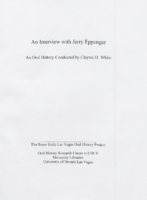
Transcript of interview with Jerry Eppenger by Claytee D. White, September 14, 2011
Date
Archival Collection
Description
Interview with Jerry Eppenger conducted by Claytee D. White on September 14, 2011. Eppenger's family moved from Arkansas to Las Vegas in 1953. Joining the Marine Corps in 1964, he was among the early combatants in the Vietnam War. After a brief time in Alaska, he returned to Las Vegas and found work as a security guard at Bonanza Hotel and Nevada Test Site before attending dealer school. Eppenger recalls local black leaders and describes episodes in segregation and racial relations of 1970s Las Vegas. He shares memories of his beloved Cadillac and the fast and lucrative lifestyle of a dealer.
Text
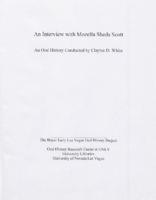
Transcript of interview with Mozella Sheds Scott by Claytee D. White, November 30, 2010
Date
Archival Collection
Description
Interview with Mozella Sheds Scott conducted by Claytee D. White on November 30, 2010. Scott discusses her varied work history and career as a directory assistance telephone operator for Centel (Sprint) in Las Vegas. Observing reading deficiencies in the community, she created the Parent-In-Charge and Word-on-a-Rock programs to improve reading skills.
Text

Transcript of interview with Lubertha Johnson by Larry V. Buckner, February 10, 1978
Date
Archival Collection
Description
Interview with Lubertha Johnson conducted by Larry V. Buckner on February 10, 1978. Johnson moved to Las Vegas in the late 1940s from Mississippi and worked as a recreation director, nurse, and director of an anti-poverty progam, serving as a civic leader.
Text
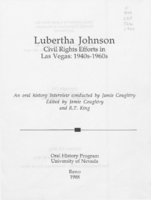
Edited narrative of interview with Lubertha Johnson by Jamie Coughtry, 1988
Date
Description
Edited narrative of an interview with Lubertha Johnson by Jamie Coughtry, dated 1988. Recalling her youth in Mississippi and move to Las Vegas, Johnson discusses civil rights, discrimination, and other topics between 1940 and 1970.
Text
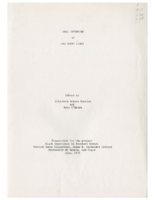
Transcript of interview with Lee Henry Lisby by Glen E. Davis, Rita O'Brian, and Elizabeth Patrick, July 10, 1975, April 10, 1978, and May 10, 1978
Date
Archival Collection
Description
Interview with Lee Henry Lisby conducted by Glen E. Davis, Rita O'Brian, and Elizabeth Patrick on July 10, 1975, April 10, 1978, and May 10, 1978. In 1942, Lisby moved from Louisiana to Nevada, where he found success in owning real estate.
Text
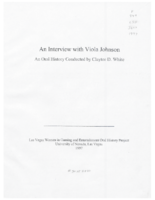
Transcript of interview with Viola Johnson by Claytee D. White, March 12, 1996
Date
Archival Collection
Description
Interview with Viola Johnson conducted by Claytee D. White on March 12, 1996. Johnson lived in a tent when she moved from Fordyce to Las Vegas in 1942. She describes working conditions for maids and the Culinary Workers Union Local 226 strikes between 1969 and 1984.
Text

Transcript of interview with Essie Shelton Jacobs by Claytee D. White, February 1, 1996
Date
Archival Collection
Description
Interview with Essie Shelton Jacobs conducted by Claytee D. White on February 1, 1996. Jacobs arrived in Las Vegas 1963 and worked in housekeeping at Aladdin Hotel for twenty-three years. Active in the Culinary Workers Union Local 226, she worked as a supervisor and shop steward.
Text

Edited narrative of interview with Audrey "June" Taylor Henry by Claytee D. White, February 26, 2010
Date
Archival Collection
Description
Edited narrative of an interview with Audrey "June" Taylor Henry conducted by Claytee D. White on February 26, 2010. Henry was a dancer, choreographer, broadcaster and Las Vegas resident since 1992.
Text
